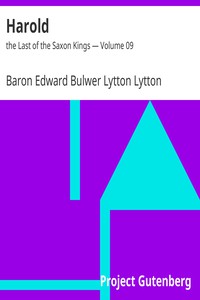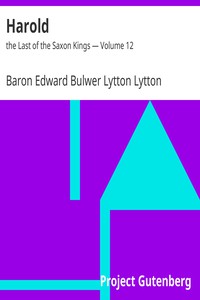Harold : the Last of the Saxon Kings — Complete, Lytton [best e reader for academics .txt] 📗

- Author: Lytton
Book online «Harold : the Last of the Saxon Kings — Complete, Lytton [best e reader for academics .txt] 📗». Author Lytton
“By my faith,” said Leofwine brightening; “these are sounds and sights that do a man’s heart good, after those doleful ditties, and the long faces of the shavelings. I vow by St. Alban, that I felt my veins curdling into ice-bolts, when that dirge came through the woodholt. Hollo, Sexwolf, my tall man, lift us up that full horn of thine, and keep thyself within the pins, Master Wassailer; we must have steady feet and cool heads to-morrow.”
Sexwolf, who, with a band of Harold’s veterans, was at full carousal, started up at the young Earl’s greetings, and looked lovingly into his smiling face as he reached him the horn.
“Heed what my brother bids thee, Sexwolf,” said Harold severely; “the hands that draw shafts against us to-morrow will not tremble with the night’s wassail.”
“Nor ours either, my lord the King,” said Sexwolf, boldly; “our heads can bear both drink and blows,—and—(sinking his voice into a whisper) the rumour runs that the odds are so against us, that I would not, for all thy fair brother’s earldoms, have our men other than blithe tonight.”
Harold answered not, but moved on, and coming then within full sight of the bold Saxons of Kent, the unmixed sons of the Saxon soil, and the special favourers of the House of Godwin, so affectionate, hearty, and cordial was their joyous shout of his name, that he felt his kingly heart leap within him. Dismounting, he entered the circle, and with the august frankness of a noble chief, nobly popular, gave to all cheering smile and animating word. That done, he said more gravely: “In less than an hour, all wassail must cease,—my bodes will come round; and then sound sleep, my brave merry men, and lusty rising with the lark!”
“As you will, as you will, dear our King,” cried Vebba, as spokesman for the soldiers. “Fear us not—life and death, we are yours.”
“Life and death yours, and freedom’s,” cried the Kent men.
Coming now towards the royal tent beside the standard, the discipline was more perfect, and the hush decorous. For round that standard were both the special body-guard of the King, and the volunteers from London and Middlesex; men more intelligent than the bulk of the army, and more gravely aware, therefore, of the might of the Norman sword.
Harold entered his tent, and threw himself on his couch, in deep reverie; his brothers and Haco watched him silently. At length, Gurth approached; and, with a reverence rare in the familiar intercourse between the two, knelt at his brother’s side, and taking Harold’s hand in his, looked him full in the face, his eyes moist with tears, and said thus:
“Oh, Harold! never prayer have I asked of thee, that thou hast not granted: grant me this! sorest of all, it may be, to grant, but most fitting of all for me to press. Think not, O beloved brother, O honoured King, think not that it is with slighting reverence, that I lay rough hand on the wound deepest at thy heart. But, however surprised or compelled, sure it is that thou didst make oath to William, and upon the relics of saints; avoid this battle, for I see that thought is now within thy soul; that thought haunted thee in the words of the monk to-day; in the sight of that awful camp to-night;—avoid this battle! and do not thyself stand in arms against the man to whom the oath was pledged!”
“Gurth, Gurth!” exclaimed Harold, pale and writhing.
“We,” continued his brother, “we at least have taken no oath, no perjury is charged against us; vainly the thunders of the Vatican are launched on our heads. Our war is just: we but defend our country. Leave us, then, to fight to-morrow; thou retire towards London and raise fresh armies; if we win, the danger is past; if we lose, thou wilt avenge us. And England is not lost while thou survivest.”
“Gurth, Gurth!” again exclaimed Harold, in a voice piercing in its pathos of reproach.
“Gurth counsels well,” said Haco, abruptly; “there can be no doubt of the wisdom of his words. Let the King’s kinsmen lead the troops; let the King himself with his guard hasten to London and ravage and lay waste the country as he retreats by the way 261; so that even if William beat us, all supplies will fail him; he will be in a land without forage, and victory here will aid him nought; for you, my liege, will have a force equal to his own, ere he can march to the gates of London.”
“Faith and troth, the young Haco speaks like a greybeard; he hath not lived in Rouen for nought,” quoth Leofwine. “Hear him, my Harold, and leave us to shave the Normans yet more closely than the barber hath already shorn.”
Harold turned ear and eye to each of the speakers, and, as Leofwine closed, he smiled.
“Ye have chid me well, kinsmen, for a thought that had entered into my mind ere ye spake”—
Gurth interrupted the King, and said anxiously:
“To retreat with the whole army upon London, and refuse to meet the Norman till with numbers more fairly matched!”
“That had been my thought,” said Harold, surprised.
“Such for a moment, too, was mine,” said Gurth, sadly; “but it is too late. Such a measure, now, would have all the disgrace of flight, and bring none of the profits of retreat. The ban of the Church would get wind; our priests, awed and alarmed, might wield it against us; the whole population would be damped and disheartened; rivals to the crown might start up; the realm be divided. No, it is impossible!”
“Impossible,” said Harold, calmly. “And if the army cannot retreat, of all men to stand firm, surely it is the captain and the King. I, Gurth, leave others to dare the fate from which I fly! I give weight to the impious curse of the Pope, by shrinking from its idle blast! I confirm and ratify the oath, from which all law must absolve me, by forsaking the cause of the land, which I purify myself when I guard! I leave to others the agony of the martyrdom or the glory of the conquest! Gurth, thou art more cruel than the Norman! And I, son of Sweyn, I ravage the land committed to my charge, and despoil the fields which I cannot keep! Oh, Haco, that indeed were to be the traitor and the recreant! No, whatever the sin of my oath, never will I believe that Heaven can punish millions for the error of one man. Let the bones of the dead war against us; in life, they were men like ourselves, and no saints in the calendar so holy as the freemen who fight for their hearths and their altars. Nor do I see aught to alarm us even in these grave human odds. We have but to keep fast these entrenchments; preserve, man by man, our invincible line; and the waves will but split on our rock: ere the sun set to-morrow, we





Comments (0)